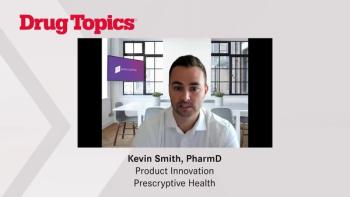
Follow-on biologics: The next frontier
The generic biopharmaceutical market is opening up great opportunities for manufacturers.
With patent protections expiring on the first biopharmaceutical products, several generic manufacturers are gearing up to move into the new marketplace. Vast opportunities lie ahead for companies that tap into the generic biopharmaceutical field. Industry analysts estimate the world market for biopharmaceuticals at approximately $20 billion.
"Preliminary estimates show that the biogeneric market is about $2 billion, and it will grow to $10 to $12 billion within the next five to six years," said Mary Anne Crandall, R.N., research analyst for Kalorama Information, a New York-based publisher.
Crandall, who is researching a report on the burgeoning biogeneric market, noted that the biopharmaceutical industry is set for continuous growth, with many new products being developed. "The future of biologics is almost incomprehensible as far as what can be developed at this point. If generic manufacturers are standing right behind [the branded companies] and are ready to pounce when the patents are up, it will definitely cause a lot of concern for the branded companies," she said.
However, refined regulatory rules for approving biogeneric versions have got to be put in place first. Currently, the Food & Drug Administration's drug approval process does not support biogeneric reviews.
Biologics differ from more "typical" chemical drugs. Biotechnology medicines generally are complex and feature large molecular mixtures derived from living organisms, while chemical drugs typically consist of smaller, synthesized, and chemically defined molecules.
According to the Biotechnology Industry Organization (BIO), the safety and effectiveness of a chemical drug can be established by the specification of its active ingredient, but the safety and effectiveness of a biotech product is determined by the manner in which it is made.
Guidance to come
The FDA announced it would release its "Follow-on Biologics Guidance" soon. Crystal Rice, spokeswoman for the FDA's Center for Drug Evaluation & Research, said, "We can't say exactly when it will be ready, but we certainly plan for this calendar year."
Center for Drug Evaluation & Research director Janet Woodcock, M.D., is chair of the FDA group developing the guidance, which will describe current scientific methods for comparing products, according to Rice. She said that the guidance would not address legal issues such as access to specific prior research.
Proving bioequivalency remains a major challenge for generic companies. Under scrutiny is how companies prove that complex biogenerics are equivalent to and as safe as branded counterparts.
"Though an approval process is needed, the amount of testing required to prove bioequivalence between generic and branded biologics is unclear," said Cutting Edge Information senior analyst Jon Hess. "Traditional generics can be compared with branded drugs through chemical specifications," he added. "But biologics contain large molecules, and there is a capacity for unpredictable interactions with the human body. This generates some safety uncertainty," Hess said.
The market is ripe for competition. Crandall noted that some of the biologics, such as Procrit (Johnson & Johnson) and Epogen (Amgen), are coming off patent this year. Others are off patent already, such as Eli Lilly's Humulin, and still others may expire next year, depending on possible extended patent protection.
"There are generics being developed for some of those biologics, such as Neupogen (Amgen) and Humulin. A lot of them are potentially coming off patent soon, and companies are already working on generics," said Crandall.
Science and safety
BIO, which represents more than 1,000 biotechnology companies and related organizations, has made its voice known on the issue. In a citizen petition submitted to the FDA last year, BIO urged the agency to conduct "an open and meaningful debate on the scientific, legal, and policy issues concerning the follow-on biotechnology products if the FDA was considering creating an approval mechanism for them."
According to the organization, FDA approval of any follow-on biotechnology medicine must be based on a full complement of original nonclinical and clinical data because of the unique scientific nature of biotechnology products.
However, the complicated guidance process will not happen overnight. "If and when a regulatory process becomes law, it must be based on best science and the best medicine available. The patient's safety should remain the hallmark of the regulatory process," said Dan Eramian, VP of communications at Washington, D.C.-based BIO.
Genentech Inc., a leader in the biologics field, agreed. "Our biggest concern is for the health and safety of our patients," said Walter Moore, VP, government affairs, at Genentech. "In biotechnology, the product is the process. Differing cell lines and manufacturing processes mean different manufacturers will make different products. A full BLA or NDA is needed to prove the safety and efficacy of all proteins. We feel it is important to be a part of meaningful dialogue among the FDA, Congress, and the industry to come to a consensus about what is best for patient safety," Moore said.
Clear pathway
The Generic Pharmaceutical Association (GPhA) has also weighed in on the issue. "The FDA is looking into generic biopharmaceuticals [or follow-on biologics] and hopefully developing a pathway that would provide clarity as to the agency's expectations and what the process will be," said Gordon Johnston, VP of regulatory affairs, GPhA.
Johnston added that GPhA believes the process should be based on science. "There needs to be a clear, definitive pathway for follow-on biologics, and then each product and the unique aspects of the biologics will be based on science. The pathway could vary for different products within the biologics category, depending on how complex they are," he said.
While not all off-patent (or upcoming off-patent) biologics may be ready to go generic, many may be good candidates. "It depends on the product. Certainly there are scientific capabilities today to develop a follow-on biologic via an abbreviated pathway, and as technology keeps emerging, more and more complex products will likely be candidates as well. There is a mixture of biologic products out there, and some products will be eligible based on current scientific techniques; for others it may be a matter of time before there are analytical tools that permit a company to properly characterize a product," Johnston noted.
With competition in the biologics marketplace, the potential exists for products to become more affordable. "Certainly under the Hatch-Waxman model for typical drugs, there has been a pretty dramatic impact on price. You would naturally believe that the economic forces would have some sort of similar impact on biologics as well," Johnston said.
Tricky time line
Patent expirations are not clear-cut in this murky area of biologics. For example, Genentech has numerous patents on its various growth hormone formulations expiring at various times through mid-2015.
"Two U.S. patents relating to microbial production of proteins, including HGH, expired in 2003one in January and another in July. We have other patents that extend beyond 2003 as well," explained Mark Krajnak, a spokesman for Genentech.
A similar situation exists with Genentech's Activase. "We have several issued U.S. patents that cover purified tPA protein, DNA-encoding tPA, and basic recombinant DNA processes for making tPA. Those patents expire from mid-2005 through mid-2006. We also have many issued U.S. patents that cover particular technology that may be used in the manufacture or formulation of tPA, and those patents expire at various times through late 2015," Krajnak said.
In the face the vast market potential for generic biologics, there are likely to be many heated debates in the future regarding the FDA's draft guidance, good science, policies, and patent expirations.
Which generic biologic will be first to emerge?
Companies such as the Sandoz division of Novartis are poised to tap into the worldwide biopharmaceutical market. The company has applied to the Food & Drug Administration for generic approval for human growth hormone (HGH), according to Claudia Arthur-Flatz, global communications manager, public affairs, Sandoz GmbH.
"For the moment we are concentrating on HGH in the United States," she said. However, Sandoz is pursuing the market in Europe as well. "We are currently waiting to hear from the EC as to whether we are receiving a marketing authorization or not for HGH."
If and when the company gains approval, it will be ready to start production. This past February, Sandoz opened its new biopharmaceuticals manufacturing plant in Tyrol, Austria. That same month, Sandoz' Slovenian affiliate Lek opened a new biopharmaceutical production facility, the first of its kind in Eastern and Central Europe.
Other generic firms, such as Mylan Laboratories and Teva Pharmaceuticals, also have strategies in place to target the biogeneric market, according to Cutting Edge Information, a market research firm in Durham, N.C.
Newsletter
Pharmacy practice is always changing. Stay ahead of the curve with the Drug Topics newsletter and get the latest drug information, industry trends, and patient care tips.























